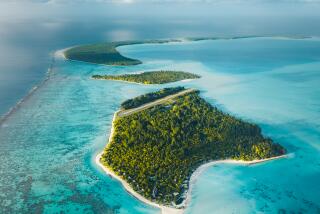Movie review: ‘The Island President’ is heartening, unsettling
- Share via
“The Island President”is heartening and unsettling by turns. The heartening segments of this powerful new documentary are intentional, the unsettling elements illustrate what happens when your protagonist gets caught in the cogs of history.
“Island President’s” leading character is 44-year-old Mohamed Nasheed, at the time the film was made the democratically elected president of the Maldives, a nation of some 1,200 coral islands scattered jewel-like in the Indian Ocean.
A cross, as the president himself says, “between raradise and paradise,” the Maldives are a prime vacation destination for those privileged enough to afford it.
But all those gorgeous beaches (stunningly photographed by director-cinematographer Jon Shenk) come at a price. The islands are barely above sea level, and any increase in global warming will inexorably lead to higher tides and the inevitable disappearance of an island chain that has been inhabited for thousands of years.
So it’s not a surprise that much of “Island President” is taken up with Nasheed’s savvy battle to get the world to pay attention to those rising temperatures. “This is not something in the future, this is something we are facing right now,” he says with typical directness. “Our survival is nonnegotiable.”
Articulate, charismatic and genuinely heroic, Nasheed proved an ideal documentary subject for Shenk, best known for co-directing “Lost Boys of Sudan.” Not only does he always say what’s on his mind, but he granted Shenk and his team unprecedented access to the kinds of insider meetings and conversations that are usually strictly off-limits for the media.
“Island President” begins at the Copenhagen Climate Summit in 2009, when 120 world leaders gathered to attempt to find a solution to global warming that would satisfy striving nations like China and India as well as first-world standard bearers like the United States and tiny but brutally affected places like the Maldives.
The film then flashes back a year to the extensive planning and preparation Nasheed initiated to maximize his tiny country’s role in the proceedings. These include speeches at the British Parliament (a newspaper headlined that he compared global warming to a Nazi invasion), meetings with unconvinced Indian officials, and a summit gathering of the wonderfully named Alliance of Small Island States or AOSIS.
The culmination of all this politicking is the Copenhagen conference itself, providing intimate glimpses of the president as a sophisticated pragmatist who attempts to bridge enormous international policy gaps while dealing with differences of opinion among his fellow countrymen.
Will the conference end with a climate change deal? Is any kind of a deal preferable to no deal at all or are some things too critical to be negotiated away? The back and forth of late-night diplomatic meetings turns out to be as much of a nail-biter as a top-tier sporting event.
Although climate change is “Island President’s” main thrust, it has another theme as well, one that starts out subsidiary yet has turned out to be especially relevant over the last several months. That would be the importance and fragility of political democracy.
Though most visitors to these gorgeous islands don’t know it, the Maldives have a recent political history that is especially tumultuous. For 30 years, in fact, the country was under the increasingly authoritarian leadership of Nasheed’s predecessor, former President Maumoon Abdul Gayoom.
For 20 of those years, Nasheed paid the price for being the leader of his country’s pro-democracy movement. He was arrested 12 times, tortured twice and spent 18 months in solitary confinement in a tiny corrugated iron cell. His triumph in the country’s 2008 balloting was as unexpected as it was electrifying.
But, as is hinted at moments into the film, the past in the Maldives is not completely dead. At the end of “Island President,” type on the screen informs us that in February of this year, “Mohamed Nasheed resigned the presidency under the threat of violence in coup d’etat perpetrated by security forces loyal to the former dictator.” Will all of the president’s work be for naught or will a way be found for him to return to power? At this point, it’s impossible to say, which makes this unusual film even more compelling and thought-provoking than it already is.
‘The Island President’
Rating: PG for thematic elements, some violent content and smoking
Running time: 1 hour, 41 minutes
Playing: At Nuart, West Los Angeles
More to Read
The biggest entertainment stories
Get our big stories about Hollywood, film, television, music, arts, culture and more right in your inbox as soon as they publish.
You may occasionally receive promotional content from the Los Angeles Times.











